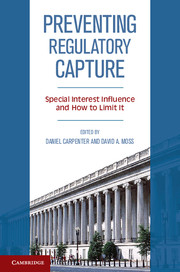Book contents
- Frontmatter
- Contents
- List of Figures
- List of Tables
- Editors
- Contributors
- Preface
- Acknowledgments
- Introduction
- Section I Failures of Capture Scholarship
- Section II New Conceptions of Capture – Mechanisms and Outcomes
- Section III Regulatory Case Studies
- 8 Capturing History
- 9 Conditional Forbearance as an Alternative to Capture
- 10 Captured by Disaster? Reinterpreting Regulatory Behavior in the Shadow of the Gulf Oil Spill
- 11 Reconsidering Agency Capture During Regulatory Policymaking
- 12 Coalitions, Autonomy, and Regulatory Bargains in Public Health Law
- Section IV The Possibility of Preventing Capture
- Conclusion
- Afterword
- Index
- References
12 - Coalitions, Autonomy, and Regulatory Bargains in Public Health Law
Published online by Cambridge University Press: 05 June 2014
- Frontmatter
- Contents
- List of Figures
- List of Tables
- Editors
- Contributors
- Preface
- Acknowledgments
- Introduction
- Section I Failures of Capture Scholarship
- Section II New Conceptions of Capture – Mechanisms and Outcomes
- Section III Regulatory Case Studies
- 8 Capturing History
- 9 Conditional Forbearance as an Alternative to Capture
- 10 Captured by Disaster? Reinterpreting Regulatory Behavior in the Shadow of the Gulf Oil Spill
- 11 Reconsidering Agency Capture During Regulatory Policymaking
- 12 Coalitions, Autonomy, and Regulatory Bargains in Public Health Law
- Section IV The Possibility of Preventing Capture
- Conclusion
- Afterword
- Index
- References
Summary
[W]e don't care about scientific things. We're talking dollars.
In a country where approximately 450,000 people die prematurely because of tobacco and 47 million people are sickened by contaminated food each year, few would dispute the relevance of public health law and policy to the overall well-being of Americans. The importance of public health looms large, even as the United States confronts a long list of structural problems ranging from reforming immigration to addressing education inequities or managing ongoing national security risks. Whether public organizations can successfully promote public health depends to a considerable degree, however, on a critical factor also shaping the nation's ability to address its other major challenges: the capacity of public organizations to execute intricate legal responsibilities without succumbing to “capture” by narrowly motivated private interests.
Some actors undeniably engage with the regulatory process by crafting pointed strategies to weaken public health rules or occasionally even dismissing scientific and health concerns in favor of “talking dollars.” In its strongest form, however, the capture thesis implies a strong claim about the efficacy of those efforts in a state that is institutionally complex and shaped by a variety of coalitions that emerge from pluralist politics. An environment in which public health officials are nonetheless all but certain victims of such capture would not only bode ill for the nation's capacity to perform a core activity of modern functioning nation-states; it would also make it difficult to expect much from bureaus working on energy policy, telecommunications, or other fields further from widespread public attention.
Information
- Type
- Chapter
- Information
- Preventing Regulatory CaptureSpecial Interest Influence and How to Limit it, pp. 326 - 362Publisher: Cambridge University PressPrint publication year: 2013
References
Accessibility standard: Unknown
Why this information is here
This section outlines the accessibility features of this content - including support for screen readers, full keyboard navigation and high-contrast display options. This may not be relevant for you.Accessibility Information
- 1
- Cited by
